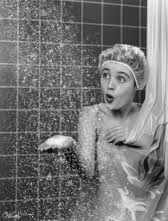
Water. Tea. Sugar. Culture. Time.
The ingredients for Kombucha reflect the simple nature of the beverage and the process. Our society makes these ingredients available in abundance, then perverts or pollutes them for profit, at the expense of the confused or even sickened consumer.
Tea may be decaffeinated with chemicals, table sugar may be laced with toxins and tap water may be carrying conspiracy, but education will always set us free. By learning which choices to make, we are empowered. So don’t be afraid to stand under that cold shower of truth – go on, jump right in – the water, as it turns out, is just fine.
********
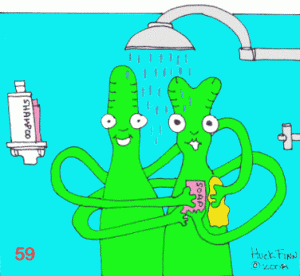
Save Water By Showering Together!
Summer has finally hit around here and we’ve sure had some hot days. Though I am rightfully upset about the disrespect our society shows for our global water supply, I am sincerely grateful and, when compared with great swaths of the world’s population, incredibly lucky to live where water is readily available not only for drinking but also for washing my body, the dishes and even my dog.
Water is the most vital building block of life, without which we perish in just days. Like a famous NY pizza crust or San Francisco sourdough bread, water has a profound impact on the flavor of Kombucha Tea and health of the Kombucha Culture. (They all depend on regional wild yeasts as well, but that’s for another post.)
Many types of water are suitable for brewing Kombucha but the most important consideration is the removal of chlorine and other contaminants that may harm the culture.
Before we dive in, some quick facts about water:
- Water is a chemical substance with the formula H2O. Its molecule contains one oxygen and two hydrogen atoms connected by covalent bonds.
- Water covers 70.9% of the Earth’s surface, and is vital for all known forms of life. Oceans hold 97% of surface water, glaciers and polar ice caps 2.4%, and other land surface water such as rivers, lakes and ponds 0.6%.
- Clean drinking water is essential to humans and other lifeforms. Access to safe drinking water has improved steadily and substantially over the last decades in almost every part of the world. There is a clear correlation between access to safe water and GDP per capita. However, some observers have estimated that by 2025 more than half of the world population will be facing water-based vulnerability.
- 1% of the water supply on earth can be used as drinking water.
- Approximately 70% of fresh water is consumed by agriculture.
- The human body is comprised of 66% water. It is in every organ and assists physical functions.
TAP WATER: IS IT SAFE TO DRINK?
It would be folly to deny that the drinking water supply is becoming increasingly contaminated via problems both environmental and systemic. Over-prescribed pharmaceutical drugs and other pollutants have been flooding into both municipal and groundwater supplies. Just as dangerous is the aging infrastructure of many city tap water facilities. Add fracking, pesticides and oil spills to the mix – that’s a whole cocktail of yuck potentially ending up in your body and wreaking havoc on your internal ecosystem. And we haven’t even touched on the chemicals they put in on purpose such as chlorine and fluoride, which attract plenty of controversy on their own.
Fear of tainted water supplies has driven some to bottled water, but as has long been known, some bottled waters are just municipal tap water with a fancy label while others are imported from foreign countries, leaving an enormous carbon footprint. To cut costs and reduce waste, more and more families are turning to home filtration systems, reverse osmosis or distillation as a safer alternative to tap water.
BONUS: Want to know how the water supply in your city measures up? Take a look at the Environmental Working Group’s water survey.
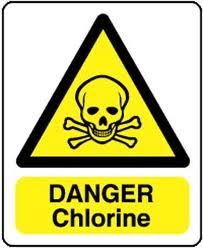 Chlorine
Chlorine
Chlorine is used extensively in municipal drinking supplies to kill contaminants such as harmful pathogens. In developing countries, the addition of chlorine has reduced the number of infant deaths related to waterbourne illnesses. However, this efficacy at killing bacteria means that it isn’t suitable to use for brewing Kombucha because it could harm the healthy bacteria that are part of the culture.
When chlorine is added to the drinking water supply, it combines with other natural compounds to form Trihalomethanes (chlorination byproducts), or THMs. THMs are considered carcinogenic and long term exposure “results in adverse effects on the central nervous system, liver, kidneys and heart.” Alternative methods to chlorine for treating drinking water include ultraviolet light and ozone, have been used extensively in Europe with great success. Some municipalities in the US have implemented these systems as well but for the most part, it is less expensive to use chlorine.
Fluoride
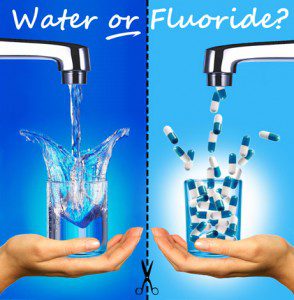 The history of fluoridation in the United States does not inspire confidence. The fact that the type of fluoride used in most water supplies in the United States is Hexafluorosilicic acid, an otherwise toxic and corrosive by-product of the fertilizer and aluminum manufacturing industries (i.e. weapons manufacturing), does not inspire confidence. Reports that 98% of European water sources are NOT fluoridated, and that there is no correlation between fluoridation and caries (cavities) in those countries, does not inspire confidence. The fact that authorities cannot control the dosage of fluoride each person ingests does not inspire confidence. I could go on, but you get the idea.
The history of fluoridation in the United States does not inspire confidence. The fact that the type of fluoride used in most water supplies in the United States is Hexafluorosilicic acid, an otherwise toxic and corrosive by-product of the fertilizer and aluminum manufacturing industries (i.e. weapons manufacturing), does not inspire confidence. Reports that 98% of European water sources are NOT fluoridated, and that there is no correlation between fluoridation and caries (cavities) in those countries, does not inspire confidence. The fact that authorities cannot control the dosage of fluoride each person ingests does not inspire confidence. I could go on, but you get the idea.
Fluoride toxicity has been linked to several diseases such as Alzheimer’s and Down’s Syndrome. More recent research indicates that topical application of fluoride (via toothpaste, mouthwash or at the dentist’s office) is more effective than ingesting. Of course, daily, thorough oral hygiene practice produces the best results, but increased calcium and magnesium intake also play a significant role in preventing cavities.
For my part, I oppose fluoridation because a) the science is, at best, unsettled and, at worst, points to completely unnecessary toxic poisoning at the hands of the MIC, and b) the concept of applying medical treatment through the water supply without the consent of those being treated is difficult to justify.
The following quote from a recent study is telling:
“Although the prevalence of caries varies between countries, levels everywhere have fallen greatly in the past three decades, and national rates of caries are now universally low. This trend has occurred regardless of the concentration of fluoride in water or the use of fluoridated salt, and it probably reflects use of fluoridated toothpastes and other factors, including perhaps aspects of nutrition.”
SOURCE: Pizzo G, et al. (2007). Community water fluoridation and caries prevention: a critical review. Clinical Oral Investigations 11(3):189-93.
BONUS: Here are some ways to remove fluoride from your drinking water.
Note: While tea does contain fluoride, in that case it is a naturally occurring substance and, approximate levels are known to be low, as opposed to the fluoridation of the water and food supply which results in unknown quantities ingested every single day.
WATER FILTERING
Filtering water is one of the most common ways households use to remove chlorine and other particles that may be in the water supply. Most countertop and pitcher water filters use activated charcoal, a very porous material that absorbs chlorine and other gasses/contaminants as they pass through. The result is usually a much better tasting, even better looking water. Still, with most pitchers filters, only 30%-60% of the contaminants have likely been removed. By contrast, undersink systems will remove up to 99% of chlorine.
BONUS: Read about the history of water filters from 2000 BC to modern times.
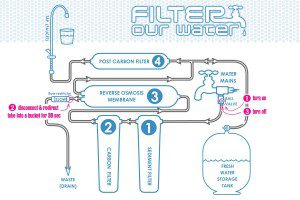 Another common type of filtering system is Reverse Osmosis. This works by forcing the water through a semi-permeable membrane. The pure water is pushed through the filter whereas the waste water goes down the drain. Finally, it passes through a charcoal filter before coming out the tap. The big disadvantage to RO is that a lot of water is wasted in this process. It takes 2 gallons of water to make 1 gallon of RO water.
Another common type of filtering system is Reverse Osmosis. This works by forcing the water through a semi-permeable membrane. The pure water is pushed through the filter whereas the waste water goes down the drain. Finally, it passes through a charcoal filter before coming out the tap. The big disadvantage to RO is that a lot of water is wasted in this process. It takes 2 gallons of water to make 1 gallon of RO water.
Distillation is a process of boiling water so that it turns into steam, then recapturing that steam, allowing it to condense as it cools. The steam returns to a liquid state free of all minerals. The downside to distillation is the lack of these minerals. Some counteract those effects by adding salt to remineralize the water.
BONUS: Learn more about the positive and negatives of distilled water.
Filtering or boiling tap water is imperative for making Kombucha. A Brita type pitcher, named for the inventor’s daughter, will do the trick. I always suggest that you use the water you have on hand. The whole point of making Kombucha at home is to save money, so using the water that you already drink won’t be an additional expense. If you do not have a filter, here are a few ways you can dechlorinate your water.
DECHLORINATION
- Evaporation – Chlorine is a gas. As such, given enough time, it will evaporate. Leave water out for 24 hours to allow the chlorine to evaporate.
- Boiling – Boil your water for 10 minutes to remove the chlorine. Those who live outside of major cities may be using well water or spring water. Oftentimes this type of water may be used without filtering. If you aren’t sure what is in your water, then check with the local water works for a free water quality report.
WATER & WORDS
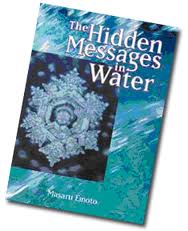 If you saw “What the Bleep” a few years back then you may already be familiar with Masaru Emoto’s work. He is a doctor of alternative medicine who purports that frozen water crystals change shape based up the intention that is directed at them. For example, crystals of water that were exposed to heavy metal music were supposed to be less aesthetically pleasing than those exposed to thoughts of gratitude or love. Being a hippy at heart, this sounds awesome! Knowing that my thoughts can change the shape of water crystals is almost as thrilling as rainbows and unicorns!
If you saw “What the Bleep” a few years back then you may already be familiar with Masaru Emoto’s work. He is a doctor of alternative medicine who purports that frozen water crystals change shape based up the intention that is directed at them. For example, crystals of water that were exposed to heavy metal music were supposed to be less aesthetically pleasing than those exposed to thoughts of gratitude or love. Being a hippy at heart, this sounds awesome! Knowing that my thoughts can change the shape of water crystals is almost as thrilling as rainbows and unicorns!
However, Dr Emoto’s lack of forthrightness in sharing his scientific process has led to much skepticism. One double blind study did bolster his case, but subsequent trials haven’t been as successful. Well, don’t let silly old science get in the way of the imagination. 😛 Adding positive words, beautiful images and playing music for your cultures are all ways to imbue more good vibrations into your booch.
DRINKING WATER WITH YOUR KT
Not only is water important for making Kombucha, but it is also important to drink plenty of it with your Kombucha. Because booch is a natural detoxifyer, you need water to flush the toxins that it releases from the body. If not enough water is consumed, the toxins may be reabsorbed into the body and then that’s defeated the whole purpose.
I start my day with 2-4 ounces of KT in a tall glass of water. Not only do I get the health benefits of Kombucha Tea but I also get water I need to rehydrate. Plus the booch tastes a bit like lemon in your water – this is also an excellent way to get some Kombucha into a loved one who is resistant to the taste. Juice is another option but also adds extra sugar.
While it is tempting to down tall glasses of KT, it is best to take small, frequent doses to ensure maximum benefit. Too much Kombucha at once may be more difficult for the body to process and depending on each person’s biochemistry, could result in a Herxheimer reaction. If you experience any discomfort while drinking Kombucha, the first thing to do is to increase water consumption while simultaneously reducing the amount of KT.
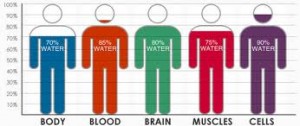

Wanda Millmine
August 2, 2022 at 9:41 amI have been brewing Kombucha and water kefir for the past five years. I have moved into a house that has a water softener and a carbon filter on the refrigerator. My SCOBY doesn’t seem as healthy, thick, as it was in my former home. The Kombucha tastes fine. However, the water kefir grains have decreased. Should I not use the water from the water softener?
Anthea Tayag
August 11, 2022 at 4:20 pmHi Wanda, thank you for reaching out! We always suggest that you use the water you have on hand if at all possible. The whole point of making kefir at home is to save money, so using the water that you already drink won’t be an additional expense. Water Kefir grains thrive in waters that contain minerals like spring water, unfortunately softened water no longer contains any minerals which is why the grains are not performing as desired. We recommend rotating through different mineral supplements to find the one that will work best for your palate & kefir i.e. lemon slice, ginger slice, molasses, dried fig, or raisins. Here’s a a link for more tips on Water Kefir – https://www.kombuchakamp.com/water-kefir-recipe
Carol Brown
July 9, 2022 at 2:17 pmI live in a rural area, where water is processed and piped to the small towns and farms and businesses. Because chlorine alone will not last very long in a pipeline, another ingredient is added to keep bad bacteria at bay, it is ammonia, which, when added to chlorine stays active in the water. Bad news is, this is called chloramine. Chloramine stays active through the wastewater treatment and out into our rivers. Comforting isn’t it? Chloramine, fluoride and who knows what else! What can we do?
Kimberley
March 30, 2022 at 7:48 amI know I’m being a total nerd, but I have a beer brewing background. Brewers tend to “build” a water profile for beer – adding various salts and minerals. Is there a know specific water profile for kombucha? I know plain tea like a pH of 6, but I’m not sure of the minerals or salt levels that would be appropriate for the best batch ever.
Carly Smith
April 4, 2022 at 8:17 amThe only firm recommendation we have is to NOT use alkaline water to brew Kombucha – simply, its a waste of alkaline water! Kombucha needs to have an acidic pH (2.5-3.5) so using higher pH water is not necessary or recommended. You can use lots of types of water – filtered tap, reverse osmosis, well water, spring water – just any water that isn’t chlorinated.
Jesse Bumbacco
July 17, 2022 at 10:12 amI use tap/chlorinated water every time. Been doing that for 6 years. Every week.
Debby Weisman
March 13, 2022 at 8:26 amI have been using bottled spring water from the purist source for nearly twenty years now without any problems. Using wooden spoons and boiling water in pyrex glass vessels I think is the solution without any mold. I like to keep the outside of the vessels very clean and a quick wipe of peppermint extract on the outside of the vessels keeps out the bugs.
Carly Smith
March 14, 2022 at 6:19 amWe’re glad you’ve found a system that works well for you, Debby!
A Winter
August 24, 2021 at 2:45 pmI’ve seen several sites that recommend the Brita filter pitcher for cultures. My experience is a 100% NO! My water kefir was slowly dying away when I changed to the Brita. My dad says they use silver in the filter which may be the reason it won’t work. I know the Shaklee filter works, but I’m trying to find one that is easier to get ahold of for most people. Anybody have one that they have personal positive experience with?
Hannah Crum
February 26, 2022 at 6:48 pmThanks for the heads up about the silver in the Brita filter – great for killing microbes – just don’t want to kill our good guys! We use a whole house filter to remove chlorine and contaminants from the water and a fluoride filter under the sink for our drinking water.
Deb Jacques
October 31, 2020 at 4:22 pmI would love to know which water filtration system you use in your home.
Hannah Crum
April 2, 2021 at 6:04 pmIts a whole house system that use coconut husk and charcoal. We had a private company install it so there’s no “brand name” – they also installed our commercial system which is why we went with them specifically.
Erin
May 14, 2021 at 9:53 amMy refrigerator water filter is a carbon filter-is that good enough for kombucha? What if I boiled the carbon-filtered water?
Hannah Crum
May 16, 2021 at 2:48 pmAs long as there’s no chlorine, then it will be safe to use for brewing. You may also boil or simply leave the water out overnight if there’s any concern about chlorine content
Rebecca Cook
October 8, 2020 at 9:30 amI started my Jun tea CB with tap water—it is difficult for me to make and store 2.5 gallons of filtered water with only the tiny pitcher filter we have.
Any negative things I should be looking out for in my Jun CB? Can probably use filtered moving forward as there is a huge difference between 1 gallon and 2.5!
Hannah Crum
February 20, 2021 at 9:39 amAs long as there is no mold, it ought to be fine. Sometimes the water can cause the yeast to smell like sulphur depending on what else might be in it. If you find that happening, you may want to switch to bottled spring water for better flavor and results.
Grace Sapia
November 15, 2019 at 9:10 pmI would like to start making kombucha. My husband and I have a reverse osmosis water filtration system, and a water distiller. I heard that kombucha needs minerals to brew properly. Since both these methods of water purification remove minerals, I was told that they might not be good sources of water to make kombucha with. Your thoughts on this would be greatly appreciated. Thank you!!
Hannah Crum
November 18, 2019 at 9:20 amYou can add some minerals back in – specifically a pinch of magnesium powder to one gallon of RO water helps to improve the taste greatly.
Grace Sapia
November 21, 2019 at 9:07 pmThank you so much!
Kaitlin
February 22, 2019 at 12:41 pmHello!
Is it safe to use water from a Berkey filter system to brew Kombucha?
Hannah Crum
March 10, 2019 at 5:57 pmYes!
Lydia Wallace
January 27, 2018 at 10:15 amI always make my tea in a pot and I wondered if pouring the leftovers into a bottle, collecting them through the week would work. I wondered about mold (would adding sugar early on and keeping it in the fridge work?) and chlorine. As it’s sitting around for days (maybe with the lid off?) would the chlorine evaporate?
Very grateful for any words of wisdom.
Hannah Crum
August 27, 2019 at 11:18 amIf you want to give it a try, we’d advise saving it in the fridge as mold can creep in if left at room temperature. Is this leftover tea or spent tea leaves? We imagine the ancestors did the same, simply adding some sugar to their spent tea, then pouring it into their Continuous Brew vessel to keep the culture happy and well fed!
Collingwood Kombucha Co.
January 10, 2018 at 10:32 amWe looking into a new Purification system that remineralizes filtered tap water to 7.2-7.6 ph or as high as 9.5 What are your thoughts and experiences with using alkaline water in the brewing process?
Hannah Crum
June 14, 2019 at 7:59 pmDo NOT use alkaline water to brew Kombucha – simply, its a waste of alkaline water! Kombucha needs to have an acidic pH (2.5-3.5) so using higher pH water is not necessary or recommended. You can use lots of types of water – filtered tap, reverse osmosis, well water, spring water – just any water that isn’t chorlinated.
Kombucha lovers
June 23, 2022 at 10:44 amMaybe this is my problem, i have bought RO Water filter and i didn’t realise that it has alkalkaline stage until i really look at every label on each tube( this tube add negative ion,bio, mineral, infrared, alkaline ). I wonder why my scoby on day 4 look weird and grow very thin. Before that i used bottled water and it grows delicious and healty. I will throw that alkaline stage and re-brew my kombucha. Do i need to use new scoby and new starter liquid?
Hannah Crum
May 30, 2023 at 10:59 amSwitch the water and see if the culture recovers. If it doesn’t grow as expected, then start over with a fresh culture here –> SCOBY
mitsuo
August 23, 2017 at 7:10 amBoiling water with chlorine creates reactive oxygen species (ROS) which causes aging and cancer among other things. If you must boil water you should do it for at least 15 minutes. If I have to use municipal tap water, I put a little vitamin C in it (1 tsp per 200 litre will eliminate the chlorine) and then use charcoal.
Beth
July 26, 2017 at 5:41 pmHi. So would you suggest I boil my tap water for 10 minutes or go buy a gallon of spring water?
Hannah Crum
June 15, 2018 at 10:10 amIt will take more time for the boiled water to cool down and it costs money and a trip to the store to buy the spring water – whichever is easier for you!
Michele
May 29, 2017 at 10:35 amI’m on well water with a carbon filter, and other than a bit of iron it tests clean.
After 5 years of brewing kombucha, I just had my first mold event. 🙁 Luckily I had a SCOBY hotel, starting over.
I just discovered a new way to drink my KT, mixed with flavored seltzer water. It reduces the acidic levels (I was worried about my teeth) adds extra carbonation, and a dash of whatever flavor! Of course, I like the flavored seltzer water all by itself, so YMMV…
Brittney
August 5, 2015 at 8:30 amCan I use bottled water if I do not have a filtration system at the moment?
Hannah Crum
August 11, 2015 at 7:30 amyes! make sure it isn’t simply bottled tap water – use spring water for the best flavor and results.
Debbie
April 3, 2014 at 7:36 pmI’ve been drinking RO water for years, is it ok to use for my kombucha. Some sites don’trecommend it because it lacks minerals, but it’s what I have on hand in my water cooler.
Hannah Crum
April 8, 2014 at 6:02 pmIf you find your KT isn’t as lively as you like, you can always add a dash of Himalayan pink salt or Celtic sea salt to the water before brewing. Overall, the culture derives a lot of nutrients from the tea & sugar.
Melanie
November 4, 2013 at 8:57 amWhat about bottled Drinking Water purified by reverse osmosis and ozonated? Our city water has been substituted with chloramines instead of chlorine, now, and does have a “reduced amount” fluoride.
Jeanne
June 24, 2022 at 9:23 amDang, my question exactly…ozonation? This is the only one that didn’t get answered
Amelia Thompson
August 28, 2013 at 12:40 pmDo you suppose it is fine to use well water? We are in a sort of rural area and we are on a well. No crops nearby. I figure the water is naturally filtered through the soil even if their was some issue. Thoughts?
Hannah Crum
August 29, 2013 at 12:01 amMany people use well water with no problem. The main concern is chlorine. Well water may contain higher mineral content which may affect the flavor of your brew. Let us know how it turns out!
Julie
July 22, 2013 at 7:16 pmOur municipal water is treated with Chloramine. What do you suggest?
Hannah Crum
July 29, 2013 at 4:22 pmChloramine is difficult to remove unless you have a special filter. Use spring water or if that is too expensive, know that the benefit of the Kombucha will outweigh the exposure to the chloramine.
Joan
June 15, 2013 at 1:41 pmIs it ok to use distilled water?
Hannah Crum
June 19, 2013 at 8:30 amYes – some folks remineralize by adding a pinch of celtic or himalayan salt.
Andrea
May 26, 2013 at 4:14 pmI just bought one of your kits and can’t wait to get started! My water supply concerns me, though. Our local water supply is both chlorinated and fluoridated. My water filter removes chlorine but unfortunately not fluoride. I’m not wild about it and plan to look into a different system to address the matter… but, in the meantime, will the fluoride affect my kombucha brew?
Thanks! 🙂
kkadmin
May 27, 2013 at 2:37 pmWe brew our Kombucha with a filtered public water supply that presumably has fluoride without ill effect. The most important consideration is that the water be chlorine free so that we do not harm the healthy bacteria in our Kombucha.
Andrea
May 28, 2013 at 12:17 pmWonderful, thanks for the 411! 🙂
Carrie
October 21, 2012 at 6:11 amI have a whole-house filtration system. Our well water passes thru 3 different tanks and a salt water softener tank. Obviously, we have some rough well water – it’s very high in iron. So, I tried making kombucha a while back with a dehydrated scoby and it never “came back to life”. I’m wondering if it’s the water. Any thoughts?
Hannah Crum
October 24, 2012 at 8:44 pmI suspect it was the dehydrated culture that didn’t work – not the water filtration system – here is an article that discusses the Pitfalls of Dehydrated and otherwise altered cultures —> https://www.kombuchakamp.com/2011/10/kombucha-brewing-problems-dehydrated-and-refrigerated-scobys.html
Rick Menzel
August 20, 2012 at 6:27 pmHi Hannah!
I’m waiting for my kit to arrive. In my wine making I use a Pure Earth Technologies 50 gal./day reverse osmosis filter for clean water. The waste water does not go down the drain but to the rain barrels for the garden.
Christopher Heil via Facebook
July 18, 2012 at 11:02 amyes spring water only please!
Bonnie
June 11, 2012 at 5:00 pmI use a Chanson Miracle Max water ionizer. The water tastes insanely good, and I can down more than a gallon per day! Since I live in the driest climate in North America, that’s REALLY important. I set my water between 4 & 5 pH when I brew my kombucha; this acidity level seems to agree with it most (and helps to mitigate mold – I’ve never had a problem using this setting).
hannah
June 12, 2012 at 12:25 pmThanks for the tip!
Annie
May 8, 2012 at 12:28 pmIf a Brita filter will work, will a PUR filter work, too?
hannah
May 10, 2012 at 4:06 pmYes! The most important thing about the water is that it must be chlorine free
Lynette Van Der Schoot
June 11, 2017 at 6:44 amI have recently researched that you can dechlorinate your water by adding a small pinch of ascorbic acid. I have begun to do this also with my Kombucha batches ALSO meaning I boil my water as well just to be sure it has all gone ..
ASCORBIC ACID
As the Kobucha seems to prefer to be acidic I have assumed this tiny amt. of ascorbic acid is fine sitting in the water.. It eventually dissolves..
Please advise if there is proof that Ascorbic Acid in your Kombucha water is not good for the Scoby. I have begun doing this as well as boiling because I have been one of those lucky people to have always lived with well water and now i do not as I have had to move to a community closer to health facilities. I am fortunate that it is a much smaller community than living in a city and thus the chlorination amt. is greatly reduced per population or so I have been told..
I am shocked at how the young people today feel that chlorine is OK . It is NOT !!!!
Hannah Crum
May 17, 2018 at 10:27 amThanks for the tip – we hadn’t heard that about ascorbic acid – if its not negatively impacting the culture (ie poor SCOBY growth, lack of fermentation, mold, etc) then a pinch should be perfectly fine to use. Of course, if your cultures start to become funky or behave differently then you may want to discontinue using it.